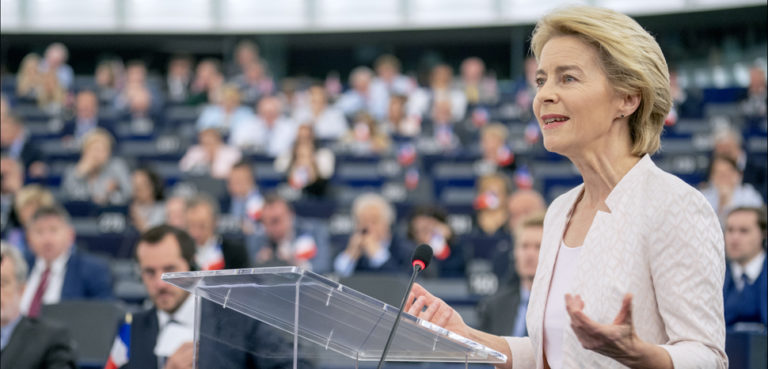From a long-range perspective, even though the formal establishment of Germany as a national state is a fairly recent phenomenon, its forerunners and preceding entities have played a significant role in European affairs for centuries. In the Battle of the Teotoburg Forrest, a coalition of Germanic tribes defeated professional Roman legionaries, crushing the Empire’s expectation of conquering Germania and expanding throughout Northern Europe, an impressive victory considering the asymmetries involved. Centuries later, the Holy Roman Empire ‒ under the leadership of Germanic rulers that were the successors of Charlemagne ‒ represented the most powerful Western European state of the Middle Ages. In the Battle on the Ice, a clash that foreshadowed the Napoleonic and Nazi campaigns to conquer Russian lands, the Teutonic Knights attacked the Novgorod Republic (a polity of Orthodox Slavs) but the attempt was repelled by Rus Prince Alexander Nevsky, a statesman whose legacy is still revered by contemporary Russians.
In the 19th century, the legendary Otto Von Bismarck masterminded the creation of a unified Germany, an accomplishment that was reached through a bold combination of both hard power and diplomatic skill. The German state became notorious for its active involvement in the deadly game of European power politics, a dangerous endeavor whose pursuit required worldly wisdom in terms of pragmatic statecraft, a strong political resolve, and the material capability to face powerful and wealthy rivals. In parallel, the unorthodox theories of nationalist economist Friedrich List inspired Germany to seek industrialization as a path to enhance prosperity and national power. Eventually, the rise of Germany as a force to be reckoned with would eventually shape the course of history in the following century, an event that would entail tectonic geopolitical shifts and a copious amount of bloodshed.
Understanding Germany’s troubled past
In a multipolar environment of simmering mutual distrust and hostility, the meteoric ascent of Germany was seen as threatening by Britain, especially considering that German strength and revisionist plans could derail the prevailing status quo (i.e. Pax Britannica). These realities ignited World War One, a conflict in which Germany was defeated. Moreover, the fallout of the confrontation triggered the collapse of most European Empires and remade the map of the continent. However, the underlying tensions were not settled so a rematch was a matter of time. During the ensuing Weimar era, a toxic combination of popular resentment and disenfranchisement, political polarization, revanchist attitudes, ideological extremism, economic hardship, social agitation, and widespread financial turmoil generated the atmosphere that the Nazi Party took advantage of in order to orchestrate a hostile takeover. Under the rule of Adolf Hitler, Nazi Germany adopted an aggressive foreign policy and, in a bid to fulfil its imperial dreams of world domination, launched a campaign of conquest. In the initial stage of World War Two, the Third Reich wanted to knock out both France and Britain to settle old scores and rid itself of possible rivals; but ultimately its most important ambitions lay to the East. Hitler’s strategists wanted to destroy the Soviet Union to increase the lebensraum of the German state, control the fertile soil of Ukraine and Western Russia (chernozem) in order to achieve self-sufficiency in food supplies, and seize the oil fields of the Caspian to fuel the German war machine. Military force, genocidal violence, and mass starvation were instruments to attain these outcomes.
In 1940, it seemed that Nazi Germany could attain victory. Nevertheless, the crushing defeat of the Wehrmacht in the fateful Battle of Stalingrad marked a turning point. German forces never recovered after such setback and the tide was reversed. Germany was vanquished by the Allies and the extinction of the Third Reich marked the ascent of both the United States and the Soviet Union as superpowers under a bipolar balance of power. Germany was occupied and partitioned. Notably, post-war Germany almost ceased to exist. The Morgenthau plan ‒ concocted by Henry Morgenthau Jr., US Secretary of the Treasury ‒ proposed the demilitarization of Germany, the dispersion of local population, its territorial dismemberment, and the dismantlement of German industrial capabilities so that country’s economy adopted an agricultural profile. Although the plan gained some traction at first, Germany dodged this bullet because Washington concluded that a prosperous, reindustrialized and strong West Germany would be far more useful as a shield ‒ and maybe even potential spearhead ‒ against the Soviet bloc.
In this regard, the creation of NATO was also a major pivotal development. As Lord Hasting Ismay ‒ the first Secretary General of the transatlantic military alliance ‒ claimed, its purpose was to keep “the Russians out, the Americans in, and the Germans down” in Europe. Nevertheless, despite its subordination, West Germany did the best it could. After all, it did not have to spend on defense since the costs were mostly absorbed by the Americans, so it could focus resources on the revitalization of domestic industry. Likewise, the Germans benefited from the availability of funds supplied by the US, access to Western consumer markets, and the ability to engage freely in international trade – a service provided by the US Navy. Nevertheless, it would be mistaken to say that Germany was a staunchly Atlanticist state during the entire second half of the 20th century. Being aware that it could literally be annihilated or worse if fighting between the Americans and Soviets broke out, it also relied on Östpolitik in order to encourage détente towards the bloc headed by Moscow. In turn, East Germany was a Soviet satellite, but it was one of most prosperous and industrialized states of the Warsaw Pact (living standards in the GDR were even higher than in the USSR itself) and it had a ruthless intelligence service. In other words, both German states were fairly relevant for their corresponding blocs even though they remained under foreign suzerainty.
Interestingly, a historical analysis reveals that Germany’s strategic alignments have fluctuated in varying degrees between a westward orientation and a Drang nach Osten (‘eastward push’). Yet this is no inconsistency. Instead, as American author Robert Kaplan asserts, such apparent contradiction is a reflection of the country’s geopolitical condition in the transition zone between the heartland and the coastline. Accordingly, the Western portion of Germany ‒ mostly Catholic ‒ has an industrial profile as well as a mercantile mindset and it also holds a cosmopolitan Atlanticist worldview. In contrast, its Eastern half ‒ which roughly corresponds with historical Prussia ‒ has long harbored nationalist attitudes and Spartan-like virtues. Said region is also known for a military tradition and a warrior ethos that go back to the days of Frederick the Great. Arguably, so far the Germans have been able to blend aspects of both in accordance with their evolving circumstances. Nevertheless, it is foreseeable that reconciling contrasting geopolitical inclinations in an era in which the Russian behemoth is colliding in multiple domains with the bloc headed by the American leviathan is going to be complicated. There is no easy way for Berlin to perform a masterful balancing act in the context of a major systemic crisis which will likely redefine the architecture of European security.
Reunified Germany as the cornerstone of the EU
In the final decade of the 20th century, the reunification of Germany fueled strategic anxieties that were not entirely unreasonable. In fact, it is known that both Margaret Thatcher and François Mitterrand were reluctant to welcome what they likely regarded behind the scenes as some sort of Anschluss 2.0, and even tried to approach Soviet Premier Mikhail Gorbachev in order to prevent it. Furthermore, in 1990 American realist thinker John Mearsheimer pointed out that an assertive Germany would likely try to get its own nuclear weapons in a strategic environment in which the dissolution of bipolarity would give birth to an era of trouble and heightened tensions amongst competing powers. In the 90s, US billionaire George Soros ‒ an ardent supporter of Atlanticism ‒ voiced concerns over the rise of a reunited Germany as a great power whose influence could engulf much of Eastern Europe as its lebensraum, and he even directly operated against the deutschemark’s exchange rate.
However, as Stephen Szabo has convincingly argued, in the period of the Bundesrepublik, Germany managed to reinvent itself as a mercurial geoeconomic power. Its national strength was underpinned not by conventional military capabilities or weapons of mass destruction, but by following a strategic policy of commercial realism, a path that harnessed German industrial prowess and its various comparative advantages. After all, considering the productivity of the German economy, it needed to secure consumer markets to which its manufactured goods could be exported. In turn, it also required reliable access to both energy and raw materials. This was done through mutually beneficial collaborative frameworks, trade, and the projection of influence through unconventional vectors such as the expansion of German private business interests.
Unsurprisingly, the German state positioned itself as the ultimate cornerstone of the European Union, even though the bloc included other heavyweights such as France, Italy and, until not ago, Britain. Germany achieved through mercantile means what it had been unable to accomplish previously through sheer coercion. EU enlargement has configured an economic bloc whose territorial reach dwarfs that of the Holy Roman Empire. Under German leadership, the process of European integration has advanced to such degree that it even shares not only a single economic space but also a common currency, which is basically a rebranded version of the deutschemark. Nevertheless, the EU is no supranational confederation with a unified structure of political authority. It is a framework whose members are sovereign national states, and therefore there are asymmetries, imbalances, diverging interests and disagreements. For example, it is no problem that competitive German high-end goods ‒ like luxury cars ‒ are sold in international markets via a currency with a high exchange rate because they are bought for their outstanding quality and added value – not because they are cheap. The same cannot be said about the primary products exported by less-developed EU members. Indeed, the German dominance in the EU is often resented in other states, especially after the 2008 Global Financial Crisis, the economic downturn experienced by several Mediterranean EU members, and Berlin’s heavy-handed approach toward the Greek sovereign debt crisis.
Navigational challenges
As a result of the Ukraine war, Germany is now caught in a very awkward and uncomfortable position. In the aftermath of said crisis, in which the global correlation of forces is at stake, Berlin’s critical vulnerabilities have been exposed and they are being taken advantage of. First, since Germany has basically outsourced its defense and national security to the nuclear umbrella provided by the US since the Cold War, it cannot autonomously address security challenges in its own neighborhood. Therefore, the Germans have no choice but to follow Washington’s strategic agenda even if that means that some German national interests are being disregarded. In turn, since the Teutonic nation is not self-sufficient in the field of energy, German industry is heavily reliant on the supply of Russian natural gas. Accordingly, Berlin’s foreign policy cannot afford to alienate Moscow whether it likes it or not. It remains to be seen whether these contradictions can be reconciled in the current zeitgeist.
Both Americans and Russians are certainly aware of Germany’s compromised position. It must be borne in mind that, in accordance with the geopolitical thinking of Anglo-American authors (both classical and contemporary), it is an imperative to prevent the development of a Russo-German partnership. The combination of Russian weaponry, manpower, and natural resources plus German wealth and technology has the potential to alter the global balance of power, control the so-called Eurasian ‘heartland,’ and even challenge the might of maritime powers from the area known as the ‘outer crescent.’ Tellingly, a retired high-ranking German senior military officer, Jochen Scholz, has argued that one of the key drivers of US foreign policy toward Europe has been to avoid the emergence of a Berlin-Moscow collaborative axis. Therefore, the instigation of upheaval and geopolitical tensions by the US in Eastern Europe and some states of the post-Soviet space could be understood as a deliberate effort to remove potential bridges that could facilitate the rise of stronger ties between Russia and Germany. If this hypothesis is accurate, then the ongoing Ukraine war gives the Americans a window of opportunity worth harnessing to undermine the prospects of a Russo-German reproachment.
Furthermore, the late Zbigniew Brzezinski ‒ former National Security Advisor during the Carter administration and geopolitical scholar ‒ explained that, since its defeat in World War Two, Germany had been essentially co-opted by the Americans as a junior partner. Indeed, the continuous presence of US forces and strategic military facilities like the Ramstein Air Base is a powerful reminder of Germany’s subordinate status vis-à-vis the US. It is also telling ‒ but not surprising ‒ that, based on the revelations made by Edward Snowden, former Chancellor Angela Merkel was under the direct surveillance of the NSA. Even though this incident deserved to be investigated, nothing could be done about it for political reasons. In other words, German sovereignty is compromised to a certain extent by these asymmetries.
On the other hand, the Russians have correctly identified Germany as the linchpin and engine of the EU. Hence, they have invested a great deal of resources, time and effort in order to pull Germany from the geopolitical orbit of the US. From the Russian perspective, without Germany there can be no meaningful transatlantic consensus and yet Moscow believes that Germany lacks the wherewithal to control much of Europe ‒ with an iron first if necessary ‒ on its own as a regional hegemon. Thus, through the development of infrastructure projects (networks of pipelines) to supply substantial amounts Russian energy to the German consumer market, the Kremlin has made sure that Berlin does not adopt a confrontational attitude toward Russia. Such deliveries are not only a source of hard cash, but also a strategic and political vehicle of influence. Through the threat of disruption, the Kremlin can pull the trigger to wreck the German economy. Thus, the recent drastic reduction in the deliveries supplied by Gazmprom though Nord Stream has been officially attributed to maintenance reasons, but since the alleged technical difficulty of restoring full capacity is being blamed on the implementation of Western sanctions, it is likely an outspoken political demonstration of how energy flows can be weaponized. If the Germans no longer want to be held hostage through their dependence on Russian fossil fuels, they do not have pleasant alternatives in the short term: all they can do is either rely on coal or the revival of nuclear power, or witness the utter collapse of their industrial capabilities. Also, the Russians have realized that, since Germany’s intellectual world is mostly dominated by worldviews anchored to liberal internationalism and even postmodern ideologies, the resulting overall lack of savoir faire in terms of Machiavellian statecraft and a reluctance to engage in fighting is a weakness that be used to strategically outfox the Germans in the ruthless chessboard of realpolitik. Finally, although the behavior of geopolitical forces is mostly determined by impersonal factors, it must be borne in mind that, since his days as a KGB spook in Dresden in the late Cold War, Vladimir Putin himself is deeply aware of the importance of Germany for Russian national interests.
So far, there are ambivalent views toward Russia in Germany. Voices aligned with militant Atlanticism are staunchly hostile to Russia. For instance, policymakers such as German Foreign Minister Annalena Baerbock and specialized commentators like Florence Gaub apparently abhor Russia and everything it stands for. In contrast, realists believe that antagonizing Russia is an unwise course of action. For example, last January Vice Admiral Kay-Achim Schönbach stated that Russia should be respected as a force to be reckoned with, and that facts on the ground like the takeover of Crimea cannot be undone. The comments were so controversial that he had no choice but to tender his resignation.
Another development that needs to be considered is that China regards Germany as a pivotal state for the completion of its ambitious long-term geoeconomic plans. Thanks to its logistical infrastructure, Germany is positioned as a platform to reach most European markets. Likewise, the advanced profile of the German economy makes it an attractive partner for Beijing. This is the rationale behind the establishment of freight railways as terrestrial corridors that foster economic interconnectedness between China and Europe in the framework of the Belt and Road Initiative. Moreover, China is one of Germany’s top trade partners for both exports and imports and Germany is also a full member of the Asian Infrastructure Investment Bank (AIIB), a development bank headed by Beijing which represents the largest multilateral institutional project ever launched by the Middle Kingdom. Likewise, considering Germany’s sophisticated know-how and world-class prestige in the domain of finance and banking and China’s interest in fostering the projection of its financial sector and in boosting the process of renminbi internationalization, there are signs of an emerging Sino-German financial co-operation. Officials from the Deutsche Bundesbank, Germany’s Central Bank, have manifested their willingness to add holdings denominated in Chinese yuan to their foreign exchange reserves. Hence, China offers a valuable opportunity for Germany to diversify its partnerships and increase business opportunities for German companies. Notably, China’s foreign policy is not revisionist when it comes to Europe; the spheres of influence of both countries do not overlap and China is too far away to threaten German national security in any meaningful way. Undoubtedly, China is America’s top strategic competitor but it is not in Germany’s national interests to automatically replicate Washington’s rivalries.
Moreover, Germany is experiencing societal problems that pose complex challenges, such as declining birth rates. With a fertility rate of 1.607 per woman in 2022, Germany is already below replacement levels ‒ a reality that encourages reasonable doubts in its viability as a leading power in the long run ‒ and the absorption and assimilation of immigrants has not sailed as smoothly as expected. As a result, Germany is witnessing the simultaneous empowerment of militant Islamism and hard-line nationalist forces. These internal tensions are not going away any time soon. In fact, their strength will likely grow under conditions of economic hardship. In addition, the increasing influence of Turkey as an aspiring great power with an ambitious Neo-Ottoman agenda is something that needs to be taken into account in Berlin. For example, back in 2017 Turkish President Recep Tayyip Erdoğan urged Turkish immigrants in Germany to vote in national elections against Merkel and traditional mainstream parties because they allegedly represented “enemies of the Turkish state,” a blatant act of interference that sparked outrage among German politicians. Although the situation did not escalate, such incident demonstrate that ‒through the overt mobilization of diaspora communities ‒ foreign states can at least try to shape German politics in accordance with their preferences.
Concluding remarks
In a nutshell, the Germans are facing a complicated dilemma. They cannot recover their strategic independence from the US because they do not have their own autonomous nuclear deterrent, and they also lack a powerful military. Likewise, getting rid of Russian energy supplies would be problematic and the potential substitutes are imperfect, costly, and partial. Of course, Germany is an industrial powerhouse so, if it wants, it has what it takes to develop a nuclear weapons program, a stronger military, and a more diversified energy infrastructure. However, the Ukraine War and its shockwaves are literally accelerating the course of history and the Germans are running out of time. For instance, the UK is promoting the establishment of a new security alliance of European states that share three common denominators: a fierce opposition to Russia, a strong Altanticist strategic orientation, and a distrustful view of Germany.
Decisions must be made, challenges must be faced, and costs will have to be paid one way or another. Berlin needs to assess its situation and play its cards wisely. If an inertial trajectory prevails, a Weimar-like disaster is conceivable. Now that history is back, Germany can have either the American security guarantee or the comfort of being a wealthy industrialized economy; but it will not be able to enjoy both at the same time anymore. Such convenience can no longer be taken for granted. In fact, the status quo that favored the Germans until recently is gone and existing partnerships will not do the trick. Since overreliance on others can backfire, the Germans will be pretty much on their own now. Therefore, Berlin’s best move would be to assume a much more autarkic, proactive, and assertive role on the world stage in accordance with the full weight of its national power. Otherwise, it will fade into oblivion as its fate is determined by external stakeholders. Being at the mercy of others is obviously dangerous for any rational state, particularly in times of trouble. Hence, the Germans will probably soon experience a rude awakening whose consequences will be felt for generations to come. The clock is ticking.
*This article was originally published on July 29, 2022.




